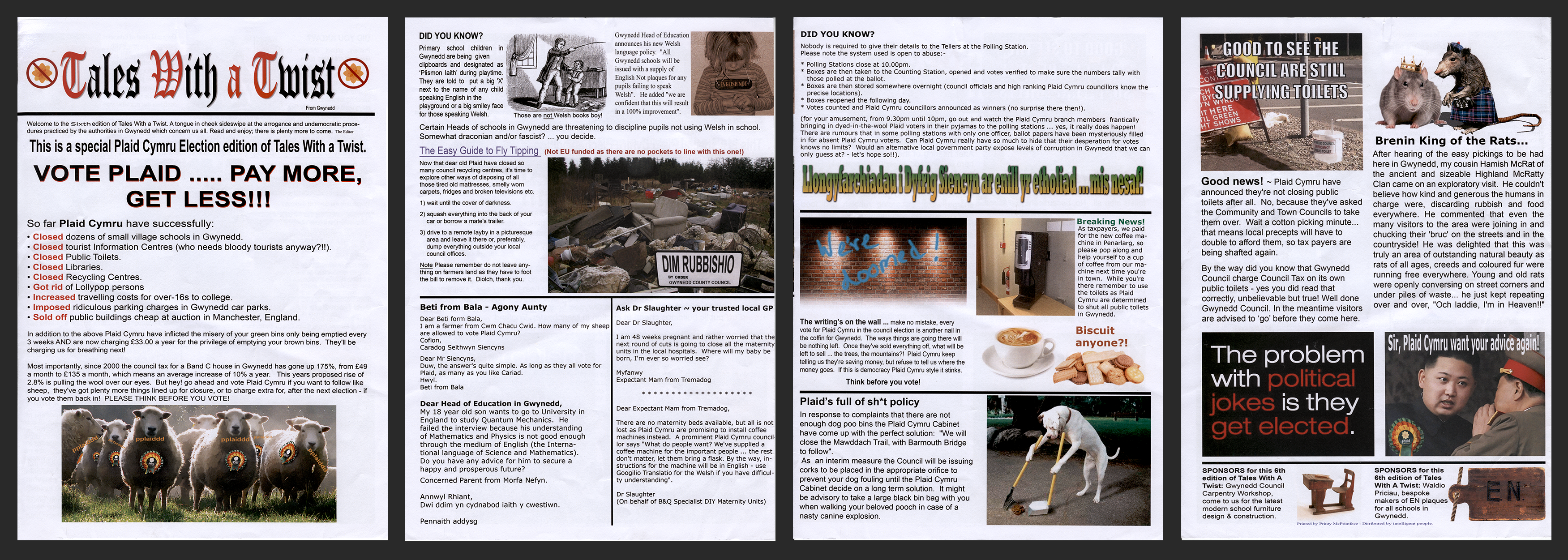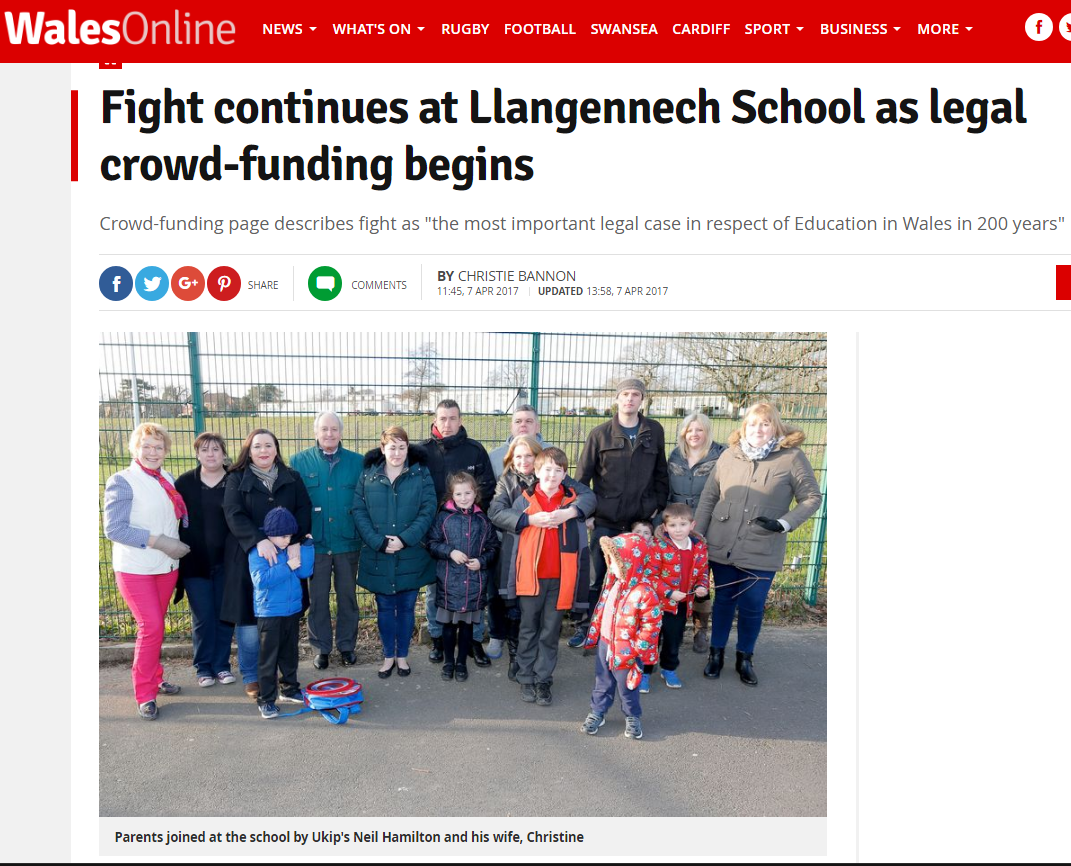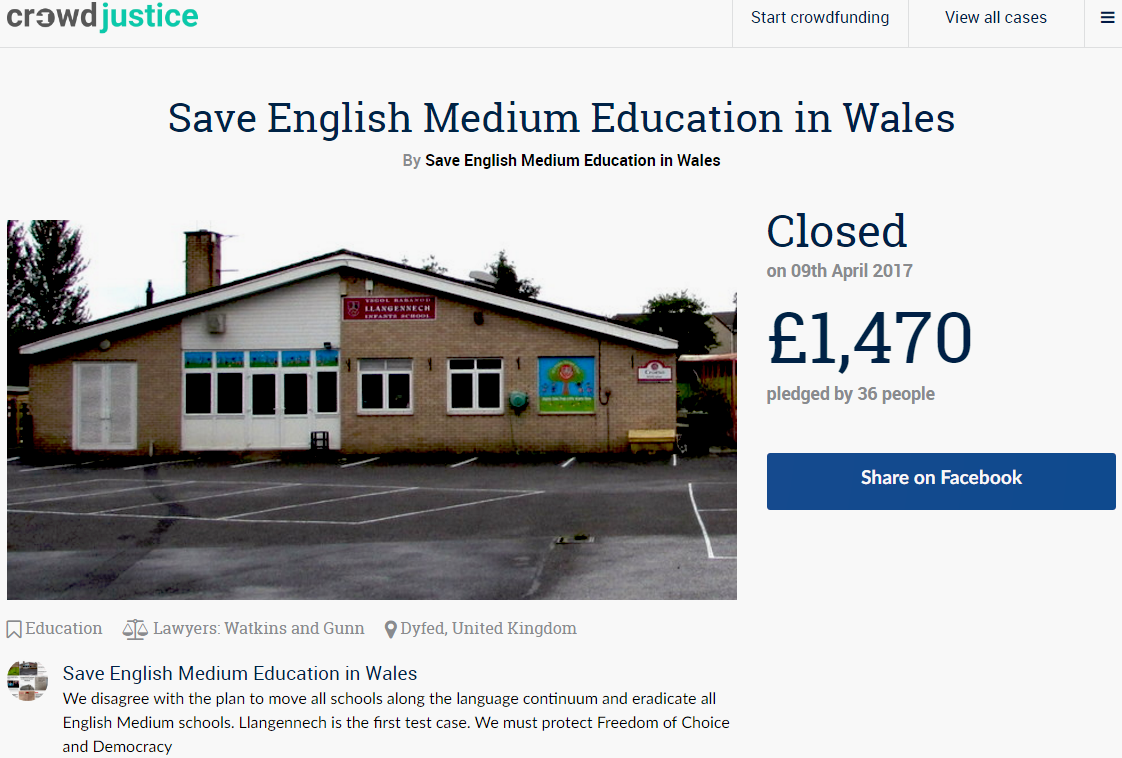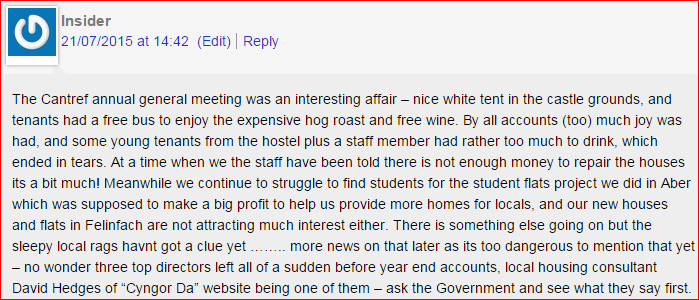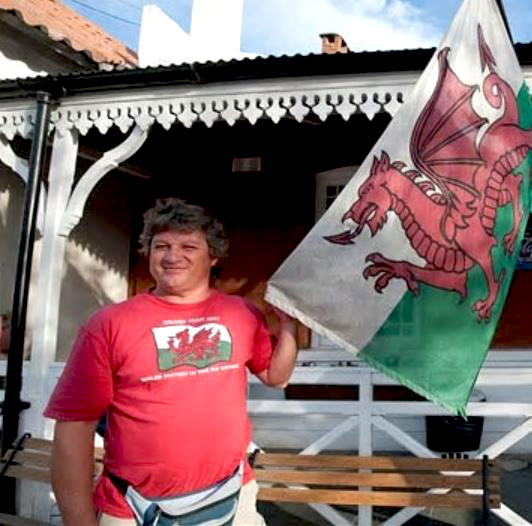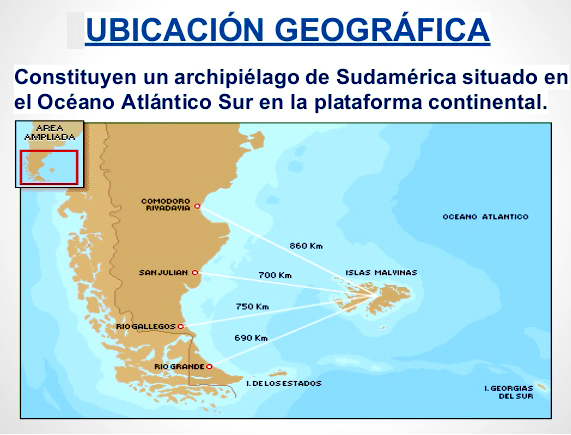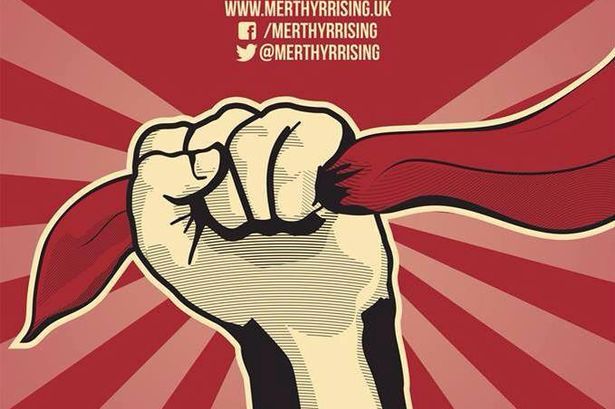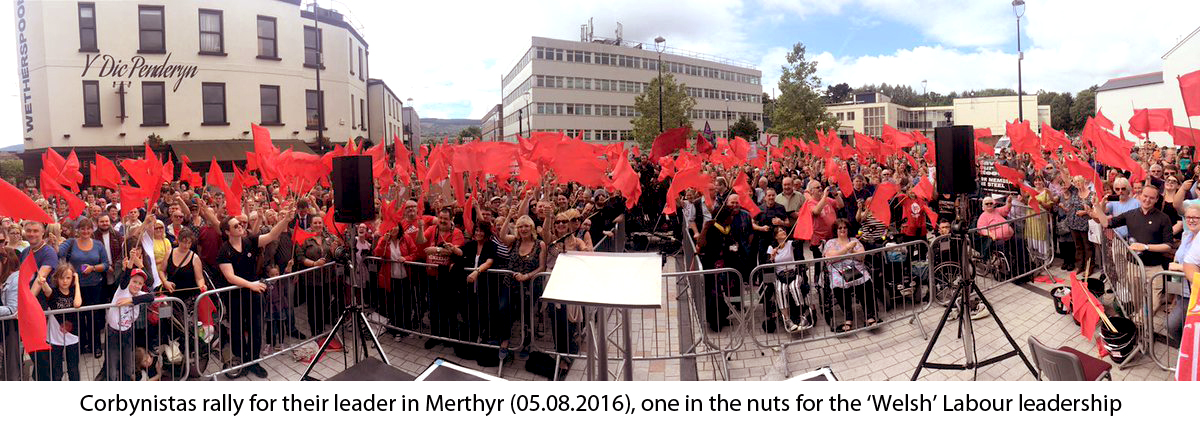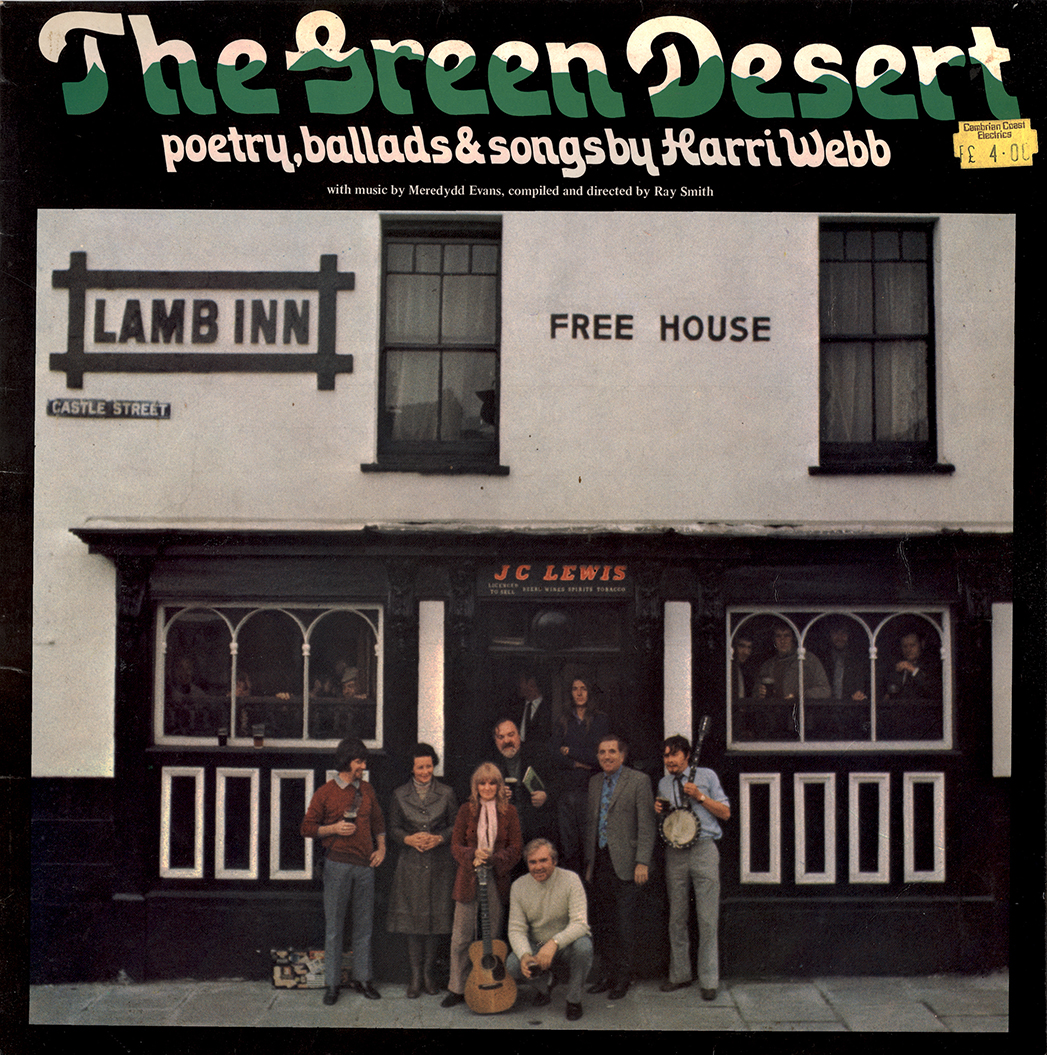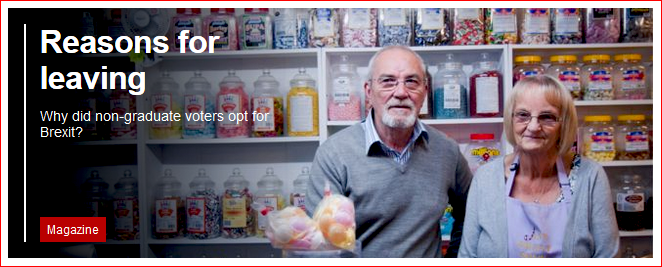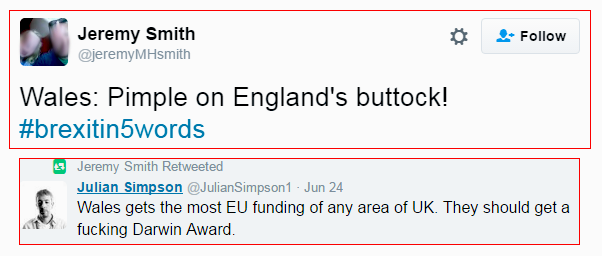A GUEST POST BY GWILYM AB IOAN
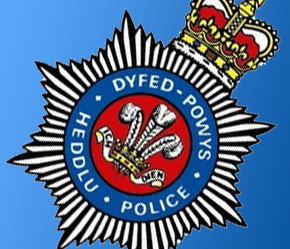 On the 28th of March 2007, I was arrested by the police in broad daylight, and in full view of the public. I was handcuffed, bundled into the back of a patrol car and whisked away to Aberystwyth Police Station – just like all other nasty and dangerous common criminals.
On the 28th of March 2007, I was arrested by the police in broad daylight, and in full view of the public. I was handcuffed, bundled into the back of a patrol car and whisked away to Aberystwyth Police Station – just like all other nasty and dangerous common criminals.
The arresting officer, an immigrant from the Midlands, called PC MICHAEL ROBERT WESTBURY – who, according to a detective inspector friend of mine, whom I had a conversation with some time later, said that Westbury (he apparently also has a cousin, or similar relative, in the police force here – so there’s two of them) is one of a small army of lazy policemen, (in fact I think the words he used were “a lazy prick who’s a pain in the arse of the local force”), transfer in to quiet backwaters like Aberystwyth, from places like Birmingham, because it’s easy work in sleepy mid Wales – offering a quiet risk free working life up to retirement age in scenic surroundings; but they also have an overwhelming need to show the ‘native woolly back’ policemen how the job should be done properly, as they (apparently) have been used to doing it in the big cities, before they transferred here. I personally think that a lot of them are also white flight racist dross that embeds itself in our communities, with a strong white (English) supremacist attitude – even towards the white skinned ‘foreign’ speaking indigenous natives of our country. There’s no restriction on any of them becoming policemen – despite their often racist attitudes.
PC Westbury sat with me in the back seat of the patrol car, I suppose it was in case I tried to escape by jumping out of a speeding car in handcuffs, or attempted to slit the throat of the driver! As they do I suppose in those big cities to the east of us. The whole scene was witnessed by all the shoppers in the vicinity, and there was quite a few of them. However, being a Wednesday, thankfully, it was not the busiest shopping day in town, but busy enough for a big embarrassment. Some, I’m sure, would have recognised me, and must have wondered what the hell I’d been up to, and what terrible crime I must have committed to trigger this kind of action – although there was no fracas in force, nor raised voices and certainly no gunshots or screams heard during the arrest! Scenes like that (in that shopping area) are usually indicative of what often happens when an abusive drunk or an aggressive shop-lifter resists arrest. I was neither, but you can bet some thought I was.
My crime?
I refused to accept an English only worded parking ticket from the parking attendant in the Rheidol Retail Park, and refused to communicate with him, or the arresting officer in the language of their queen. The sign that warned the public about parking restrictions in the Rheidol Retail Park was also written in English only. Note that this was just ten years ago, a full fourteen years after the introduction of The 1993 Welsh language Act. For the reader’s information – quote:
The Welsh Language Act 1993, is an Act of the Parliament of the United Kingdom, which puts the Welsh language on an equal footing with the English language in Wales.
The Laws in Wales Acts 1535–1542 had made English the only language of the law courts and other aspects of public administration in Wales. The Welsh Courts Act 1942 had given the right to use Welsh in courts providing that the Welsh speaker was under a disadvantage in having to speak English, but this was very narrowly defined by subsequent case law. The Welsh Language Act 1967, overturned these decisions and gave rise to the concept of ‘equal validity’ between the Welsh and English languages. As a result, Governmental Departments began preparing documents in Welsh, and following a campaign of destroying or vandalising unilingual English road signs by members of Cymdeithas yr Iaith Gymraeg (The Welsh Language Society), local councils were allowed to provide many bilingual signs in Wales. It was however the Welsh Language Act 1993 which established that ‘in the course of public business and the administration of justice, so far as is reasonably practicable, the Welsh and English languages are to be treated on the basis of equality.‘ Welsh Language Act 1993 – source Wikepedia 2017.
So what were the chain of events that led to the arrest?

I had pulled up in a quiet corner of the car park to allow my wife to go into a shop and was minding my own business. The wife incidentally is English (well mixed Welsh/ Irish parentage actually – although classified as English) and originally from Birkenhead. I only add that bit, to emphasise the fact that I am totally anti racist – before someone responds with accusations of racism being involved on my part here. I HATE the way we are treated as a colonised country by England and the attitude of Brit Nats who colonise and abuse our country and it’s natives. I do NOT hate English people on the basis of their race. Just to be clear on that point, before I go further.
After a few minutes a dour faced parking attendant approached my car and gestured for me to wind my window down. I obliged and he asked me – in English – if I was aware that I had parked in a restricted area. I replied in my mother tongue, that I had not actually noticed the sign, and in any case, if I had noticed it and it was not displayed in the official native language of my country, then I would have ignored it anyway. He responded with a curt, “I don’t speak Welsh, so you’ll have to talk to me in English”. I replied again in my native tongue that his failure to understand me was his problem and not mine. He then said in English “I know you can understand me, if you don’t move, I’ll give you a ticket”. Talk of red rags & bulls! However with great restraint, I politely replied that that was his prerogative, but unless he addressed me in my language of choice, then he could stick his ticket where the sun doesn’t shine. At this point he took out his little book and started scribbling, I wound up the car window. He then stuck the ticket under one of the windscreen wipers. I quietly got out of the car, read the ticket, and noted that it was in English, with not a word of Welsh written or printed on it. Consequently, I screwed up the ticket and stuffed it in the top pocket of the parking attendant’s coat (much to his horror – perhaps he feared I was going to stuff it into one of his orifices), whilst telling him calmly to go away and procreate, preferably on the other side of Offa’s Dyke. He reacted by saying that I had assaulted him with my action, and that he was now going to call the police. I invited him to do whatever he thought necessary. By then the wife had returned and I slowly drove around to the other side of the car park so that she could go into Lidl’s.
Whilst sitting quietly in the car, again minding my own business and listening to Radio Cymru, I heard a police siren, then I caught sight of the patrol car, complete with blue flashing light & siren. PC Westbury screeched to a halt in front of me and leapt out of the car – I was half expecting him to be armed, considering the song and dance that he was engaging in during the development of this perceived ’emergency’. Again I was gestured to wind down my window. Now we all have this ability to be able to gauge the mood of a person by the look on their face. Rather than the dour, ‘fed up with life’ and miserable look on the parking attendant’s face a short time earlier, I immediately picked up on anger and rage this time. With hindsight it was obvious that it was not the screwing up of the ticket and stuffing it in the pocket of the parking attendant’s pocket that had disturbed PC Westbury, but probably the fact that I had made a fool of one of his co-patriots, and he was about to make an example of me for being such a mutinous, bolshie ‘Welsh nashie’. How dare I!
Anyway, the conversation went along similar lines to the earlier conversion I’d had with the attendant. With Westbury laying the law down in English and me responding in Welsh. Finally he said “listen, if you don’t respond to me in English I’ll arrest you” I shrugged my shoulders and turned my palms upwards. At this, his fuse blew, he opened my car door and shouted for me to get out. Then came the caution “I’m arresting you on suspicion of common assault and a breach of the peace, you do not have to say anything but it may harm your defence if you do not mention when questioned something you later rely on in court . . . blah, blah, blah . . .” Click, click, handcuffs on. Wife dropped her shopping in Lidl, rushed out gaping to see me being scurried away in the back of the police car.
At the police station

The custody sergeant was a seasoned old campaigner from Talgarreg – who had been around the block a few times and was close to retirement I would guess. Westbury went through the process of explaining that he had arrested me for suspected assault on a ticket warden in the Rheidol Retail Park’s private car park. The heavily moustached sergeant (classic Victorian ‘Bobby’ look) turned to me and asked if I had anything to say. I for my part explained in Welsh that I had actually been arrested because I had refused to converse with the arresting PC in English. He rolled his eyes heaven-wards and a wry smile crossed his face. I guess he recognised who I was, as I had been quite a regular mini pantomime villain ‘celebrity’ on the TV and in newspapers since 2002 due to my infamous political work whilst I was a national vice president of Plaid Cymru, the chair of Plaid Cymru Ceredigion, and the horror politician who had the temerity to say (what everyone actually knew but said nothing) that Wales had become the dumping ground for oddballs, social misfits and society dropouts in recent years (see the photo & caption at the head of this paragraph). I was also quite well known for my close association with Cymuned in those days – who were blazing a trail at the time. He also, I assume, knew the individual who had made the arrest very well from past experience, and it just added to his woes for the day.
He answered in Welsh saying that this was all a bit infantile (I presume he meant on PC Westbury’s part), however he told me that as I had been officially cautioned and arrested he had no option but to ‘process’ me. It was evident that he was miffed with Westbury, because, the first thing he said was I don’t think there’s a need for those constable – pointing to the handcuffs. He then asked me to empty my pockets, Westbury quickly interjected with “be careful sarge” – as if I might pull out a grenade launcher or AK47 or some similar weapon from my jacket pocket once the cuffs were off! Sergeant Thomas (I believe he was a Thomas from memory, although I might be mistaken – it’s been a while) responded with “I don’t think we’re likely to get attacked here constable” – slyly winking at me. If it wasn’t all so serious, you couldn’t be blamed for breaking out in an underwear wetting laughing fit of incredulity over the whole farce.
Next up, the process of taking fingerprints, palm prints, shoe prints and of course a DNA sample. Sgt. Thomas then asked if I wanted a solicitor I said “certainly”, quick as a flash he said “a Welsh speaking one I presume?”. I said “wrth gwrs!”. By this time Westbury was fast starting to feel like a pork pie in a Jewish wedding. To try and recover control of the situation he said “shall I put him in a cell sarge?”. Sgt Thomas: “no I don’t think that that’ll be necessary constable, he can keep me company here, I could do with someone to chat to!”. And that’s how I spent the rest of the afternoon, chatting to Sgt. Thomas about how times had changed, who we both knew, who I knew in Talgarreg, and how utterly stupid the whole situation was. He explained that this was purely down to unnecessary bureaucracy and an ignorance of cultural understanding, and insensitivities towards the natives and their language by police incomers. He said that all this had become more pronounced since the influx of ‘foreign’ police imports from over the border that had increasingly been taking place over quite a few years. He said it was nothing like this in his day and he would be glad when he retired to be out of it. Quite enjoyable really watching characters being dragged in and processed at the custody desk. Mostly drunks, crack-heads and shop-lifters – REAL criminals! Mostly English immigrants by their accents, although one drunk was Welsh!
The Legal Representation Bit
 Now, the only proficient Welsh speaking solicitor that could be found was Iestyn Davies at the Evans – Roberts law firm in Machynlleth. They said they would send someone down to Aberystwyth police station to brief me – as and when they had someone available. They also told me not to take part in any interviews and not to sign any statements until their man arrived. This was code for ‘make yourself comfortable, we’ll get someone there before the morning!’. This was about 2 o’clock in the afternoon. In fact their first reaction when I told them why I was at the station was “you’re joking – this isn’t serious is it?”. It seemed that they were a bit hesitant, because they thought it was the work of a prankster. I’d declined using my own solicitor, because I would have had to pay for him, instead I insisted on a Welsh speaking ‘duty’ solicitor that the police used – why should I pay for this nonsense from my own pocket?
Now, the only proficient Welsh speaking solicitor that could be found was Iestyn Davies at the Evans – Roberts law firm in Machynlleth. They said they would send someone down to Aberystwyth police station to brief me – as and when they had someone available. They also told me not to take part in any interviews and not to sign any statements until their man arrived. This was code for ‘make yourself comfortable, we’ll get someone there before the morning!’. This was about 2 o’clock in the afternoon. In fact their first reaction when I told them why I was at the station was “you’re joking – this isn’t serious is it?”. It seemed that they were a bit hesitant, because they thought it was the work of a prankster. I’d declined using my own solicitor, because I would have had to pay for him, instead I insisted on a Welsh speaking ‘duty’ solicitor that the police used – why should I pay for this nonsense from my own pocket?
Tracking down a solicitor in Aberystwyth had proved futile. When told that the ‘prisoner’ (me) wanted to conduct everything in Welsh – including any future court hearings, they had shied off. It was apparent that there were some floating around who could parler the ‘lingo’ but were obviously not so confident in their prowess of written work and especially not written legal work. I realised that this was a marathon in the making.
Fitness for custody and questioning
 In the mean time my beloved had hoofed it down to the police station from Lidl’s. She was making a nuisance of herself in the police station reception area, demanding to know what the hell I had been arrested for, and further demanded to see me. Apparently that does not fit in to the protocols of custody. Anything she wanted me to know, or that I wanted her to know, had to be relayed via station officers. She then informed them that I was a diabetes sufferer, and if they did not care for my food and fluid intake, they could be held responsible for my health condition. That instigated another mini panic amongst my incarcerators. After a team huddle in the corner, they decided that they would have to get a doctor in – to establish if I was fit enough for questioning and detention.
In the mean time my beloved had hoofed it down to the police station from Lidl’s. She was making a nuisance of herself in the police station reception area, demanding to know what the hell I had been arrested for, and further demanded to see me. Apparently that does not fit in to the protocols of custody. Anything she wanted me to know, or that I wanted her to know, had to be relayed via station officers. She then informed them that I was a diabetes sufferer, and if they did not care for my food and fluid intake, they could be held responsible for my health condition. That instigated another mini panic amongst my incarcerators. After a team huddle in the corner, they decided that they would have to get a doctor in – to establish if I was fit enough for questioning and detention.
Yes you guessed it, this required the services of a police approved doctor who was fluent in Welsh. More panic and more frantic phone calls. After about two hours of this ‘doctor hunt’, Sgt. Thomas came to plead with me, asking whether I would accept a Polish speaking doctor instead. I burst out laughing, “does he also speak Welsh?” I asked, “well no” he said, “but he’s not English”. Oh dear, then started the lesson for Sgt. Thomas that this was NOT about what race the doctor was, but what I simply wanted was to be examined by someone who spoke to me in my own language. You’re not really the brightest light bulb in the room I thought – despite being a pleasant chappie. Strange how these things always seem to boil down to race. Couldn’t they see that all I was doing was exercising my legal, and statutory human rights in my own country? To save having to be bunked up overnight in a cell, I relented and said I would agree to being examined by the Polish Dr.
He duly arrived and set about the examination. He confirmed that I had raised glucose levels in my blood, but I was coherent, not drunk, and totally sane. Small relief there! He also insisted that I was fed at regular intervals with low sugar diabetic diet ingredients, got given plenty of fluids on demand (so pots of tea on demand – great), and I was to be given access to my medication, which just happened to be at home in Aberaeron. Emergency prescription written up on the spot for Metformin, that someone had to trundle to the pharmacy to get. During all this experience, the Polish Doc seemed intrigued with my tale of why I had been arrested. When I explained it all to him his face lit up. He could relate fully to my predicament, having been under Soviet rule for years, and having to submit to the use of the Russian language in his native Poland. He also spoke of the secret police, and how his people were treated during Soviet occupation. I think he would have stayed there for a week chatting to me if he could. He warmly shook my hand, said I needed to carry on the good fight for freedom and finally left. I felt I’d found a kindred spirit, he’d also helped while the time away, whilst I still waited for the ‘legal beagle’ to turn up.
The Interview and statement taking
 Finally the ‘legal beagle’ from Machynlleth showed up, a long time after his usual office hours. He was still bemused by the whole event, and could hardly believe it. Totally on-side and greatly supportive of my stand (as you’d expect from a Welsh Nationalist born in the town of Owain Glyndŵr’s original parliament building). He set about arranging my police interview, after giving me a quick run-down of what to say and what not to say under caution. He also said that the whole thing was a total waste of time, as he didn’t believe that the Crown Prosecution Service (CPS) would entertain such a ludicrous application for prosecution by the police.
Finally the ‘legal beagle’ from Machynlleth showed up, a long time after his usual office hours. He was still bemused by the whole event, and could hardly believe it. Totally on-side and greatly supportive of my stand (as you’d expect from a Welsh Nationalist born in the town of Owain Glyndŵr’s original parliament building). He set about arranging my police interview, after giving me a quick run-down of what to say and what not to say under caution. He also said that the whole thing was a total waste of time, as he didn’t believe that the Crown Prosecution Service (CPS) would entertain such a ludicrous application for prosecution by the police.
Panic number three set in. Sgt Thomas with duties at the custody desk couldn’t take part. The only other Welsh speaking officers available were not confident enough in their linguistic skills in the minority language of the colony to conduct an interview, much less be able to write up the statement. Now the hunt was on again, this time to find a native born officer who was fluent enough in Welsh to conduct the interview. Finally, they managed to track down a young Welsh speaking female officer, but had to wait for her to come on duty. So the minutes continued to tick over into hours, in the company of Sgt. Thomas and a by now, very bored, tired and fed-up looking solicitor.
Eventually the work shift changed. Sgt. Thomas wished me well as he left for home, saying not to worry, as he couldn’t imagine the case going to court. A young policewoman conducted the interview (halting repeatedly to ask the solicitor & I how to spell certain words). I signed it and then had to wait for the new custody sergeant to process it. I was told that I was to be released on bail, and unless I turned up at the station periodically a warrant would be issued for my arrest. Happy days. I left at about half past eight at night, having been detained for a full seven hours.
I turned up to answer bail for months on end. About fifty percent of the time it was a wasted journey, because there wasn’t a Welsh speaking officer available to deal with me every time I presented myself. I was getting to know swathes of officers, and the whole issue became quite a popular topic at the station. Most of the native policemen were extremely supportive, and it became a big joke generally amongst them – mostly at Westbury’s expense.
However, the CPS DID eventually decide TO prosecute. However court hearing after court hearing was postponed, until (I guess) someone somewhere decided that this farce had to be kicked into touch. My solicitor, over many months and lots of letters down the line, received the final letter from the CPS declaring that they were going to drop it, due to lack of evidence. The decision was probably based on costs as well, because the penny dropped that the eventual hearing would have required full translation services, the witness statements of Westbury & the parking attendant would have to be translated into Welsh, and the hearing would have to be conducted in Welsh, and all verbal testimony by the monoglots translated in court. Plus more importantly the publicity would have been caustic.
I had great plans of making a real whoo-ha of the matter, as soon as the court case was over. However my health at that time, had become very poor, I suffer with Behçet’s disease, apart from other problems like diabetes etc. I also had a major heart attack not long after this circus had closed. So, without the inclination, due to fatigue, and being too poorly to put any energy into the campaign I let it drift. Finally it became such an old issue that it was not worth pursuing. Had the situation been different, I was going to make a formal police complaint (I still have the form). Involve the IPCC, the Board for Racial Equality and of course I was going to pepper press releases to politicians, the TV companies & papers. However it was not to be – a missed opportunity sadly.
ENTER PARKING-EYE!
You know how it works. A CCTV camera takes a snapshot of your number plate as you enter the car park. It then takes another picture as you leave. The information is relayed (by a private company without your permission) to ParkingEye (PE) whose registered Office is 40 Eaton Avenue, Buckshaw Village, Chorley, Lancashire, PR7 7NA. If the interval between the first and second photo is greater than two hours, you get a letter from these parasites demanding £50 or £85 if you don’t pay fast enough. It’s not a fine. Fines can only be legally imposed by Governments (local or central, through by-laws). You are not breaking any laws, so it’s not a police matter, it’s a civil matter between you and PE. In fact, this is a demand by menaces, because if you don’t pay they threaten to apply to a County Court (small claims division in Northampton) for the recovery of the money they say is owed to them. Most people pay on demand. Those that do go to court often have the case dismissed (e.g. 28/03/2014 DDJ Potts dismissed claim 3DJ13428, ParkingEye v Williams as PE could not produce a contract in court). However it’s a big money generating industry, despite the ones that slip the net.
My son and I, in separate cars, but at the same time got caught a few weeks back. We had over run our time limit by a few minutes. Guess where? Yes, Rheidol Retail Park. They’ve given up on employing parking attendants (I like to think that I may have had a small part to play in that – as described above). In any case, the land owner (and that’s where it gets really interesting – as I’ll disclose in a minute), has engaged PE via their property management company in London, to guard their car park property for them, and pocket the money generated. Paying PE a commission I assume. It will amaze you where the money actually lands up.
When they first took over the contract, PE put up their notices in English only. Many must have complained about this. I know that I got caught twice. I entered into correspondence with them – in my native Welsh of course – pointing out the equal status of Welsh and English in Wales etc. They responded in English, demanding I translated my letters into English for their convenience – some hope! After ping-ponging these letters they gave up on both occasions. It’s surprising what the realisation of what may be involved does to these ignorant parasites, especially when they consider the cost of translators. Moving the hearing to a court in Wales at the request of the defendant, and having the hearing conducted in Welsh – it acts like DDT on mosquitoes (or in their case maggots).
Anyway, they seem to have seen the error of their ways and all signage is now bilingual. One little victory for us at least, but they still have problems with bilingual correspondence. Now following this latest experience, I decided to do some research. Apparently a good way forward is to contact the actual land owner who deploys PE. It is often the company that has the shopping property, who provides the car park for the convenience of it’s shoppers. They will more often than not get their contractor PE, to drop the issue, simply because it’s not good business to aggravate your customers who may stop spending with you. Others who are caught in this trap, but who who are not so savvy, or would prefer to pay the bill to get rid of the hassle, just do so. This, however, is not the land ownership case when it comes to the Rheidol Retail Park car parks. Most people wrongly assume the car parks are the property of the Council, they are not. Others assume the land owner is either Lidl, Iceland or Argos – again – wrong.
The land is owned by Downham Properties Ltd. This is an UK tax dodging off-shore company registered in Jersey. They are the owners of the land in Aberystwyth that the Rheidol Retail Park car parks are located on.

However the trail does not end there. Downham Properties Ltd. use a property management company in London to manage their business, Fletcher King, 61 Conduit Street, London, W1S 2GB. It is they presumably who hire the dogs (ParkingEye) to collect the revenues from the locals on behalf of their client, the Rheidol Retail Park landowner – Downham Properties Ltd.
PE have been the subject of a Ceredigion Trading Standards investigation on more than one occasion. However, as usual, nothing seems to have come of it to date.

Local businesses in Aberystwyth have called for the car parks to be taken over by Ceredigion County Council. The council dodged the issue by saying they are on private property – haven’t they ever heard of compulsory hire/ purchase by local councils?

So, the situation is: Downham Properties Limited, who are obviously a UK tax dodging company registered in Jersey, have bought the land in our country. They in turn use a property management company in London to manage the site in our country. The property management company contracts out the work to PE – based in Lancashire – to fleece locals of money that supports not one but three companies, and their profit margins are huge, hence the reason they’re registered off-shore to DODGE taxes on their profits.
Now in a normal country (and we haven’t been ‘normal’ since the Acts of Union of 1536 & 42, as we are colonised, decimated culturally, linguistically & historically treated as second class citizens in our own country), this would never be allowed to happen. Then to cap it all the peasants are sodomised financially by the likes of Downham Properties Ltd. who – even in the eyes of our colonisers – are a pariah.
Now shouldn’t the Plaid Cymru leader of Ceredigion County Council address this problem on a local level? Much more so now that Ceredigion also has a new Plaid MP. Let’s not hold our breath though, whilst waiting for some action, we could all perish in the process – and our language & culture will disappear along with us.
ADDENDUM (01-08-2017)
On the 17th of July I sent an e-mail to Ben Lake, MP for Ceredigion, with carbon copies to:
- Dafydd Llywelyn (Plaid Cymru Police Commissioner for Dyfed Powys Constabulary)
- Arfon Jones ((Plaid Cymru Police Commissioner for the North Wales Constabulary) and
- Ellen ap Gwynne (Plaid’s overall council leader for Ceredigion County Council)
Inviting them to read this post, as I felt that the contents should be of interest/ serious concern to them. I received two automated ‘message received’ reports, one from Dafydd Llywelyn and the other from Ben Lake’s office at Westminster.
At the time I quipped on this Blog that we shouldn’t hold our breath for a response. However, whilst I still haven’t received a written response from the two commissioners or the council leader, Ben Lake MP – much to his credit – sent me a lengthy reply, which unusually for politicians, did not duck the issue or make excuses. Rather, he fully sympathised with the contents, and further assured me that he would investigate further and would act on the results of his inquiries.
You can view the contents of my original correspondence, and Ben Lake’s response by cliking HERE.
I have to humbly withdraw the comment I rather flippantly made previously, which indicated a suggested and probable negative non response that I had anticipated from the Plaid ‘quartet’. That is not the case, and I am glad to report that Ben Lake’s reply was not only supportive and genuine but also friendly and down to earth. The young man has greatly elevated his status in my eyes.
I still await a reply from the other three. Perhaps what we are seeing here is a new generation of Plaid politicians that might be drawing away from the typical ‘sons of the manse’ types that we have become so used to within Plaid, or the ‘socialist’ types who just curl their tail around Labour’s leg and purr! These two types – whom I have been a harsh detractor of in the past, need to be replaced with genuine representatives of our people, who will fight with a bit of tenacity for our freedom and independence. There does seem to be a little nucleus forming with the likes of Adam Price, Neil Mc Evoy plus a few others, and now possibly Ben Lake perhaps?
Let’s certainly hope so!


